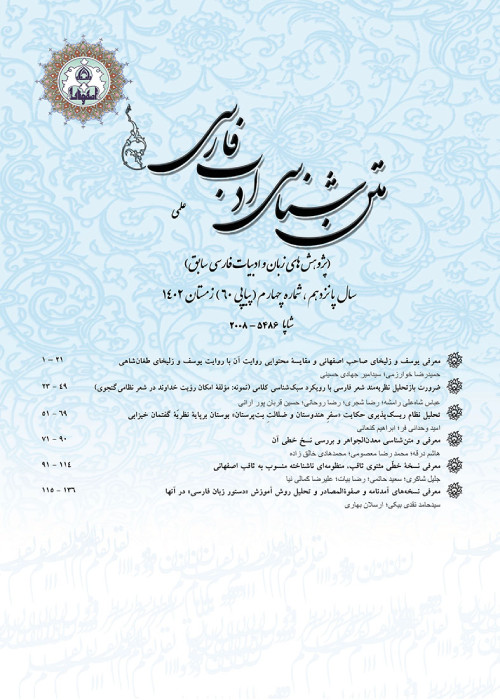A Reflection on the Correction of Amir Hasan Yazdgerdi from Zahir Faryabi's Divan Based on Hakim Oglu's Copy
Author(s):
Article Type:
Research/Original Article (دارای رتبه معتبر)
Abstract:
Abstract
Zahir Faryabi (died 1201 AD) is one of the prominent figures and poets of Iran's odes in the 13th century. His Divan has been published several times in Iran and India. The late Yazdgerdi's correction of Zahir Faryabi's Divan, originally published in 2013 by his student Asghar Dadbeh, can be considered the best and most revised correction of Zahir's Divan, but in this version, the corrector did not use older versions, including the version of Noor Usmaniyeh Library, the manuscript of Hakim Oglu, and the manuscript of Safineh Tabriz. We can find some problems in this Divan. To date, many researchers have focused on the late Yazdgerdi's edition and its errors including Seyyed Ali Mirafazli and Sharifi Sahi. They have addressed these problems based on the Safineh Tabriz and the manuscript of the Noor Osmaniye library. In the present study, the authors have addressed some of these shortcomings using the descriptive-analytical method and by comparing the late Yazdgerdi's correction with Hakim Oglu's copy. Hakim Oglu's copy is one of the looted copies of Astana Sheikh Safi in Ardabil, which has no written date, and according to the type of writing and its contents, it was probably written in the 7th century AH from the original copies. The present study shows that by collecting better editions and other collections such as essays and tazkiras, a comprehensive and revised edition of this divan can be available. It can also be used as a reference for researchers.
Zahir's next destination was Azerbaijan. Before that, he stayed with a person named Safiuddin in Ardabil for two months, but he did not pay attention to him as expected by the poet. Therefore, he left Tabriz by way of Sarab and entered the court of Qezel Arsalan who praised him. Zahir achieved a high position in the court of Qezel Arslan. Finally, he passed away in 1201 AD.
Zahir Faryabi followed Anvari's method and brought it to perfection. For this reason, some of the critics have exaggerated him and even preferred him to Anvari. Zahir's poetry is like Anvari's fluent and full of precise meanings. In Zahir's poetry, we rarely come across complicated cases, and those cases are not comparable to the poems of his contemporary poets in Iraq and Azerbaijan in terms of ambiguity. At the same time that Zahir commits difficult lines, his poetry is easy and the lines are defeated by his power of expression. Zahir's power is great in the eulogy, and in this field, he creates many meanings (Safa, 1990, p. 757).
Research
2) Gross mistakes:In some cases, the shortcomings of Yazdgerdi's correction are obvious errors that cannot be considered typographical errors.
3) Incorrect preferences in Yazdgerdi's correction:There are some cases in Yazdgerdi's correction that the recording of Hakimoglu's version is preferable.
4) Typographical errors:In Yazdgardi's correction, there are many cases that should be considered typographical errors.
5) Correct recordings in Safine Tabriz and Hakimoglu's copy:In Hakim Oglu's version, there are also recordings that confirm the recording of the Safine Tabriz version. It would have been better if it had been used in Yazdgerdi's correction.
Discussion of Results and
Zahir Faryabi (died 1201 AD) is one of the prominent figures and poets of Iran's odes in the 13th century. His Divan has been published several times in Iran and India. The late Yazdgerdi's correction of Zahir Faryabi's Divan, originally published in 2013 by his student Asghar Dadbeh, can be considered the best and most revised correction of Zahir's Divan, but in this version, the corrector did not use older versions, including the version of Noor Usmaniyeh Library, the manuscript of Hakim Oglu, and the manuscript of Safineh Tabriz. We can find some problems in this Divan. To date, many researchers have focused on the late Yazdgerdi's edition and its errors including Seyyed Ali Mirafazli and Sharifi Sahi. They have addressed these problems based on the Safineh Tabriz and the manuscript of the Noor Osmaniye library. In the present study, the authors have addressed some of these shortcomings using the descriptive-analytical method and by comparing the late Yazdgerdi's correction with Hakim Oglu's copy. Hakim Oglu's copy is one of the looted copies of Astana Sheikh Safi in Ardabil, which has no written date, and according to the type of writing and its contents, it was probably written in the 7th century AH from the original copies. The present study shows that by collecting better editions and other collections such as essays and tazkiras, a comprehensive and revised edition of this divan can be available. It can also be used as a reference for researchers.
Introduction
Zahir Faryabi is one of the distinguished figures and poets of Iran's odes in the 13th century AD. Zahir was born in Faryab and passed his elementary education there. Then, he went to Neishabur to complete his studies and stayed in this city for six years. Apparently, during this period, he entered the court of the ruler of Neishabur, Taghanshah, but he did not receive favors from him according to his position. After Neishabur, Zahir went to Isfahan and as it appears from his odes, he stayed in Isfahan for a year and a half to two years. In Isfahan, Sadruddin Khojandi did not pay much attention to him. So, he traveled to Mazandaran. In Mazandaran, Hossam al-Daulah Ardeshir visited him and the poet received his blessings.Zahir's next destination was Azerbaijan. Before that, he stayed with a person named Safiuddin in Ardabil for two months, but he did not pay attention to him as expected by the poet. Therefore, he left Tabriz by way of Sarab and entered the court of Qezel Arsalan who praised him. Zahir achieved a high position in the court of Qezel Arslan. Finally, he passed away in 1201 AD.
Zahir Faryabi followed Anvari's method and brought it to perfection. For this reason, some of the critics have exaggerated him and even preferred him to Anvari. Zahir's poetry is like Anvari's fluent and full of precise meanings. In Zahir's poetry, we rarely come across complicated cases, and those cases are not comparable to the poems of his contemporary poets in Iraq and Azerbaijan in terms of ambiguity. At the same time that Zahir commits difficult lines, his poetry is easy and the lines are defeated by his power of expression. Zahir's power is great in the eulogy, and in this field, he creates many meanings (Safa, 1990, p. 757).
Materials and Methods
In this study, we have addressed some of the shortcomings of Zahir’s Divan using the descriptive-analytical method and comparing the late Yazdgerdi's correction with Hakim Oglu's version. Hakim Oglu's copy is one of the remarkable copies of Astana Sheikh Safi in Ardabil, which has no written date, and according to the type of script and its contents, it was probably written in the 7th century AH from the original copies.Research
Findings
The present study shows that by collecting better editions and other collections such as anthology and tazkira, a more revised edition of the so-called divan can be achieved. It can also be used as a reference for Zahir Faryabi’s researchers and prevent future possible shortcomings. The shortcomings and defects of Yazdgerdi's correction, which could be minimized by referring to the two mentioned versions, are as follows:1) Writing two stanzas of two consecutive verses in the form of one verse:By comparing the late Yazdgerdi’s book with the Hakimoglu library's manuscript, it was seen only in one case that the poetic stanzas were moved. In this case, due to the mistake of the scribe, a stanza of a verse that was not in the original version was added to another stanza of another verse.2) Gross mistakes:In some cases, the shortcomings of Yazdgerdi's correction are obvious errors that cannot be considered typographical errors.
3) Incorrect preferences in Yazdgerdi's correction:There are some cases in Yazdgerdi's correction that the recording of Hakimoglu's version is preferable.
4) Typographical errors:In Yazdgardi's correction, there are many cases that should be considered typographical errors.
5) Correct recordings in Safine Tabriz and Hakimoglu's copy:In Hakim Oglu's version, there are also recordings that confirm the recording of the Safine Tabriz version. It would have been better if it had been used in Yazdgerdi's correction.
Discussion of Results and
Conclusions
By examining and comparing the proofreads of the late Yazdgerdi and the copies that he did not have access to, the conclusion is reached that despite the hard work of the proofreader, there were shortcomings and confusions in the proofreading of this Divan. Considering the importance of Zahir Faryabi in the history of Persian literature and in the field of odes and praise poems, it is necessary to have access to a revised text in the re-editing of the Divan from all the manuscripts that the editor of the Divan at that time had access to. Therefore, it is necessary to use secondary sources such as Nizheh Majles of Sharvani in the revision.Keywords:
Language:
Persian
Published:
Textual Criticism of Persian Literature, Volume:15 Issue: 3, 2023
Pages:
73 to 88
magiran.com/p2631605
دانلود و مطالعه متن این مقاله با یکی از روشهای زیر امکان پذیر است:
اشتراک شخصی
با عضویت و پرداخت آنلاین حق اشتراک یکساله به مبلغ 1,390,000ريال میتوانید 70 عنوان مطلب دانلود کنید!
اشتراک سازمانی
به کتابخانه دانشگاه یا محل کار خود پیشنهاد کنید تا اشتراک سازمانی این پایگاه را برای دسترسی نامحدود همه کاربران به متن مطالب تهیه نمایند!
توجه!
- حق عضویت دریافتی صرف حمایت از نشریات عضو و نگهداری، تکمیل و توسعه مگیران میشود.
- پرداخت حق اشتراک و دانلود مقالات اجازه بازنشر آن در سایر رسانههای چاپی و دیجیتال را به کاربر نمیدهد.
In order to view content subscription is required
Personal subscription
Subscribe magiran.com for 70 € euros via PayPal and download 70 articles during a year.
Organization subscription
Please contact us to subscribe your university or library for unlimited access!




